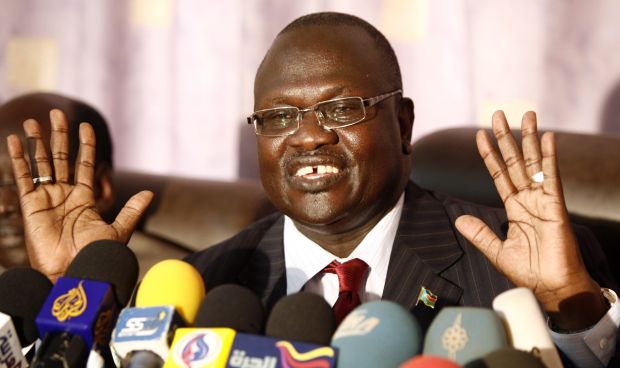
A file picture dated May 30, 2011, shows former South Sudanese Vice President Riek Machar speaking during a press conference in Khartoum, Sudan. (EPA/Philip Dhil)
London, Asharq Al-Awsat—Peace talks in Addis Ababa between South Sudan rebels and the country’s government have stalled over the issue of political prisoners.
A spokesman for the rebels, Yohanis Musa Pouk, confirmed to Asharq Al-Awsat on Tuesday that a session had been canceled during discussions over the issue despite “a number of mediators . . . [traveling] to Juba to urge Salva Kiir to release the detainees.”
He added that the talks would resume “within a couple of days” following the mediators’ return to Addis Ababa, the capital of neighboring Ethiopia, from Juba.
“If the detainees are released as expected,” he said, “we will sign an end to hostilities within a couple of days.”
The rebels, who are opposed to President Kiir, have demanded the immediate release of all political prisoners.
But government chief negotiator Nhial Deng Nhial said on Tuesday that Kiir had told mediators that “detainees could not be released immediately” due to “necessary legal procedures,” adding that anyone indicted following those investigations would be sent to trial.
Fierce fighting between the rebels and the Sudan People’s Liberation Army (SPLA), the government’s armed forces, has rocked the world’s newest state since December 15, when President Kiir accused former Vice President Riek Machar of attempting to stage a coup against him.
The fighting has drawn international concern. Having started as a purely political conflict, it has now taken on a highly volatile ethnic dimension, with forces loyal to President Kiir, who is an ethnic Dinka, fighting Machar’s rebels, an ethnic Nuer.
Nhial previously said his government was optimistic about the achievements of the dialogue with the rebels, which is being mediated by the Intergovernmental Authority on Development (IGAD), and called on all parties to end hostilities to prepare the climate for dialogue.
However, he dismissed the possibility of discussing sharing power and resources with the rebels, and said the two parties would discuss the remaining issues to reach a final solution after agreeing an end to hostilities.
He added that talks between the two sides were continuing and would not be affected by the absence of IGAD’s mediators, who were in Juba to discuss the issue of the detainees.
On Monday, Sudanese President Omar Al-Bashir arrived in Juba for talks with Kiir to discuss the conflict.
Speaking to Asharq Al-Awsat, former Security Chief of the SPLA Edward Lino denied there was an agreement between Juba and Sudan to deploy joint forces to protect oil fields in the country.
Bentiu, the capital of South Sudan’s oil-rich Unity State, has now been taken over by the rebels, with the South Sudanese government confirming oil is no longer flowing from the state’s fields.
Lino said: “There is no agreement to deploy joint Sudanese and SPLA forces in the oil-producing areas,” adding that is was “Khartoum’s dream to return to South Sudan after its soldiers left the South eight years ago. They are the dreams of Al-Bashir to control oil and to continue the war in the Nuba Mountains, Darfur and the Blue Nile.”
“Bashir is not concerned about the people of South Sudan,” he added. “He wants their oil.”
